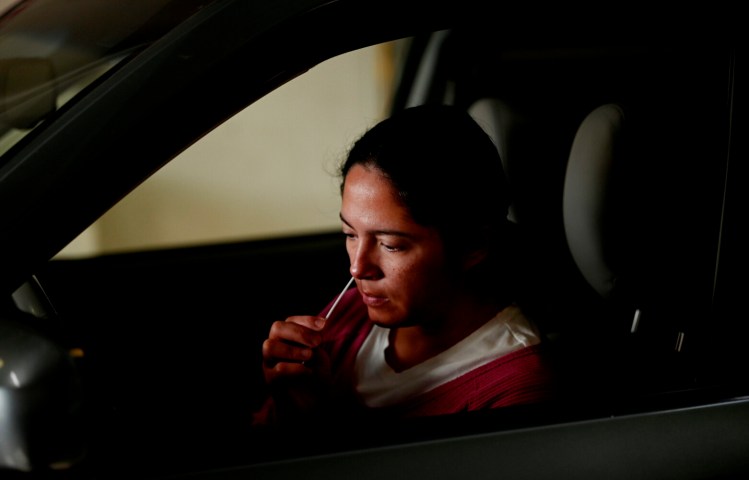Maine is ending its COVID-19 contact tracing program on Tuesday because the now-dominant omicron variant is making the program ineffective, health officials said on Wednesday.
Contact tracing is the process by which public health employees contact people who were exposed to COVID-19, warning them and advising those exposed to monitor for symptoms and quarantine if necessary.
“Omicron is epidemiologically different than other variants. People start spreading it sooner, before contact tracers may be able to reach them,” said Dr. Nirav Shah, director of the Maine Center for Disease Control and Prevention. The problem is that people who are infected with omicron are contagious before they get sick and often spread the virus to others before contact tracers would even be aware of the positive case.
Research is still ongoing, but it appears that omicron is contagious about two days before other COVID-19 variants, and as soon as a day after getting infected, public health experts say. That early contagiousness gives omicron a head start on contact tracers. Shah likened it to a track race where omicron is wearing a jetpack and the virus “can be halfway around the track before public health gets its shoes on.” For similar reasons, Maine ended contact tracing in schools this year.
Ending the program will free up about 20 Maine CDC employees to work on other aspects of the COVID-19 response, or in other areas at the agency, Shah said. Contact tracing still will occur in some settings, such as hospitals and prisons, but will be discontinued for the general population.
The contact tracing program is a separate but parallel initiative to case investigation, which also has been scaled back but not halted. Case investigation is the process of investigating cases by getting in touch with people who have been diagnosed with COVID-19, determining where they may have been exposed and identifying who may be close contacts.
Shah also said ending contact tracing is not related to the backlog of positive test results – which now stands at 58,000. The backlog will be addressed when Maine moves to an automated system to track cases, a change that is in the works, but there is not yet a timetable for when it will be launched.
In other news, hospitalizations for COVID-19 nosedived again on Wednesday, as signs point to pandemic conditions easing in the state and much of the nation.
Maine health officials reported 344 people hospitalized with COVID-19 on Wednesday, 14 fewer than Tuesday, and well off the peak of 436 patients on Jan. 13. Since that peak, hospitalizations have declined by 21 percent.
Of those hospitalized Wednesday, 83 patients were in critical care – a 37 percent drop compared to the Dec. 13 peak of 133 critical care patients – and 38 were on ventilators. Hospitalizations have declined almost every day since Jan. 22 as the omicron wave appears to be on the downward slope.
Dr. James Jarvis, COVID-19 incident commander for Northern Light Health, the parent company of Eastern Maine Medical Center in Bangor and Mercy Hospital in Portland, said that they have noticed a decline in COVID-19 patients, but hospitals are still strained.
“Hospitals are still very, very busy and very challenged,” Jarvis said.
EIGHT NEW DEATHS
Meanwhile, the Maine CDC recorded eight new deaths from COVID-19 on Wednesday, bringing the pandemic total to 1,759.
The CDC also reported 1,340 new cases of COVID-19 on Wednesday, although daily case counts are being de-emphasized as a reliable metric of current pandemic conditions. Besides the massive backlog of positive test results, there are other reasons why daily case counts are skewed and not being used as a barometer of pandemic conditions, such as the proliferation of at-home tests and restricted supplies of tests.
The omicron variant quickly became the dominant strain in Maine, according to data from The Jackson Laboratory, which does variant testing for the Maine CDC. According to the latest report, omicron went from 24 percent of samples tested in late December to 98 percent by mid-January.
Testing from wastewater systems in Portland and Yarmouth indicate the virus is declining in Maine. Portland released results on Wednesday showing a 50 percent decline in virus prevalence at its East End treatment plant over a five-day period from Jan. 27-31, and a 56 percent drop at its Westbrook plant over the same time period.
In another good sign, the positivity rate – the percentage of molecular tests returned positive – declined from 21.2 percent two weeks ago to 13.7 percent on Wednesday.
Shah said the trends are all pointing in the right direction, but in some areas omicron has sharply declined to levels lower than the delta variant, but in other areas omicron has surged again after declining.
“The data are encouraging, but we want to see more of what the latter part of this curve looks like,” Shah said. “COVID is down, but it may not be out.”
Copy the Story LinkSend questions/comments to the editors.




Success. Please wait for the page to reload. If the page does not reload within 5 seconds, please refresh the page.
Enter your email and password to access comments.
Hi, to comment on stories you must . This profile is in addition to your subscription and website login.
Already have a commenting profile? .
Invalid username/password.
Please check your email to confirm and complete your registration.
Only subscribers are eligible to post comments. Please subscribe or login first for digital access. Here’s why.
Use the form below to reset your password. When you've submitted your account email, we will send an email with a reset code.